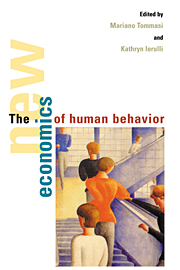Book contents
- Frontmatter
- Contents
- Contributors
- Preface
- Introduction
- PART I DISCRIMINATION AND IMMIGRATION
- PART II CRIME, PUNISHMENT, AND RIGHTS
- PART III ALL IN THE FAMILY
- 5 Human capital, fertility, and economic growth
- 6 Marriage market models
- 7 The marriage premium
- PART IV GOVERNMENT AND POLITICS
- PART V HEALTH, RELIGION, AND MASS BEHAVIOR
- Index
5 - Human capital, fertility, and economic growth
Published online by Cambridge University Press: 03 December 2009
- Frontmatter
- Contents
- Contributors
- Preface
- Introduction
- PART I DISCRIMINATION AND IMMIGRATION
- PART II CRIME, PUNISHMENT, AND RIGHTS
- PART III ALL IN THE FAMILY
- 5 Human capital, fertility, and economic growth
- 6 Marriage market models
- 7 The marriage premium
- PART IV GOVERNMENT AND POLITICS
- PART V HEALTH, RELIGION, AND MASS BEHAVIOR
- Index
Summary
Gary Becker has combined two research areas, human capital and the economics of the family, to understand economic growth. Human capital theory (1964, 1975) examines the determinants of earnings and wealth through the accumulation of knowledge and skills. Formal education in schools is an example of skill acquisition. However, investments in job training, health care, and searching for a better job are other examples of human capital accumulation. Becker's work on human capital forms the theoretical base upon which almost all modern labor economics is built. The second area is fertility. He first wrote about the economic determinants of fertility in 1960, and his research has continued over the past three decades. The combination of human capital theory and the economics of fertility produced fundamental changes in the way social scientists view not just the workings of the family, but the entire dynamic process of social interactions.
Human capital theory states that individual differences in skills and productivity explain differences in earnings across individuals. Just as firms choose to purchase new equipment based on its contribution to increased profitability, individuals decide to increase their productivity through investments in their skills. The longer time period the skill can provide a return, the more likely an individual chooses to invest in human capital.
- Type
- Chapter
- Information
- The New Economics of Human Behaviour , pp. 77 - 91Publisher: Cambridge University PressPrint publication year: 1995
- 1
- Cited by

